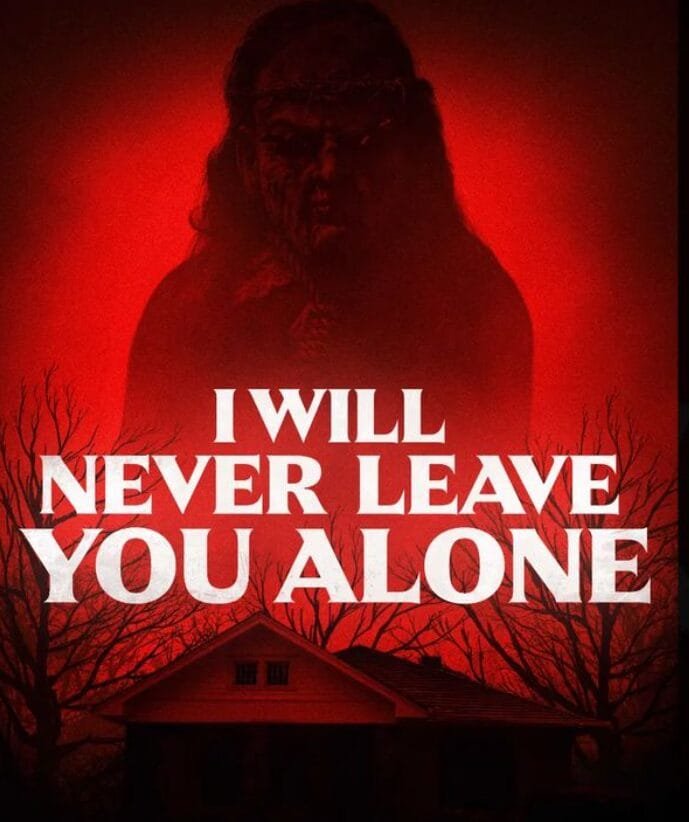I Will Never Leave You Alone (2024)

In the vast and chilling world of horror cinema, I Will Never Leave You Alone (2024) brings a familiar but disturbingly effective concept to the forefront—the terrors of isolation and obsession. Directed by emerging talent, Sarah Thompson, the film leans heavily into psychological horror, with supernatural elements that blur the line between reality and madness.
Plot Overview
The story follows Emma, a young woman recovering from the trauma of a stalker who terrorized her for years. Trying to reclaim her life, she moves into a small, isolated home near the forest, hoping for peace and solitude. But soon after moving, Emma begins experiencing eerie, unexplainable phenomena. Lights flicker at random, whispers echo through the walls, and doors open by themselves. The worst part? She starts receiving messages—directly on her phone and written on her walls—each one containing the same chilling phrase: “I will never leave you alone.”
What begins as subtle paranoia quickly spirals into full-blown terror when Emma sees shadowy figures lurking in her home. She begins to question whether her stalker has returned or if something much more sinister and supernatural is playing tricks on her mind. The suspense builds as Emma battles the unseen force determined to break her spirit, making her question her reality and sanity.
Atmosphere & Cinematography
What sets I Will Never Leave You Alone apart is its eerie atmosphere, expertly crafted through cinematography and sound design. The film’s use of shadows, low lighting, and tight camera angles brings a sense of claustrophobia. The home, which is supposed to be Emma’s refuge, becomes a haunting prison, with every creak of the floorboard and flicker of light amplifying her sense of dread. The director uses wide, sweeping shots of the forest to contrast the suffocating confines of the house, reinforcing Emma’s isolation.
The sound design also plays a crucial role. Throughout the film, there are faint whispers, disembodied voices, and ominous tones that feel like an audible representation of Emma’s fractured mental state. Even moments of silence become nerve-wracking, as the audience is left anticipating the next terrifying occurrence.
Character Development & Performance
The film’s central performance by Jessica Harper (Emma) is outstanding. Harper brings a grounded and emotionally charged performance that elevates the film’s psychological elements. She portrays Emma not just as a victim of a stalker, but as a woman fighting to regain control of her life in the face of relentless trauma. Harper’s ability to show Emma’s vulnerability, fear, and eventual descent into paranoia is a testament to her acting skills.
While Emma is the focal point of the film, the supporting characters—especially David Tucker (Emma’s concerned friend) and James Kelly (a detective investigating the strange occurrences)—provide a necessary grounding for the plot. However, the lack of depth in their characters sometimes leaves viewers wanting more context about Emma’s past and the supernatural forces surrounding her.
Themes & Symbolism
At its core, I Will Never Leave You Alone explores themes of trauma, isolation, and obsession. Emma’s stalker represents the all-consuming force of trauma that haunts victims long after the initial event. The repeated phrase, “I will never leave you alone,” is symbolic not only of the literal stalker but also the lingering effects of emotional scars.
The house itself becomes a metaphor for Emma’s mind, a once-safe place that has become compromised by fear and paranoia. As the film progresses, it’s clear that the threat isn’t just external but internal as well. Emma’s inability to distinguish between the real and the imagined creates a tension that grips the audience until the very end.
The supernatural elements, especially the malevolent presence haunting Emma, can be interpreted as a manifestation of her unresolved trauma. The film hints at the possibility that Emma’s fears have given life to something darker—whether it’s psychological or paranormal is left ambiguous. This ambiguity keeps viewers on edge, allowing the horror to transcend physical threats and dive deeper into the terror of the mind.
Special Effects & Practical Effects
I Will Never Leave You Alone uses a combination of practical effects and CGI to achieve its scares. The subtle, creeping shadows, flickering lights, and shifting objects all enhance the film’s unsettling atmosphere. The supernatural entity, often represented as a dark silhouette or a series of distorted reflections, is eerily effective in its simplicity. The practical effects, such as the messages appearing on the walls and objects moving on their own, feel tangible and create a sense of grounded horror.
One standout moment involves a scene where Emma tries to escape the house, only for the doors to slam shut, and the furniture rearranges itself as if controlled by an invisible force. The tension in this scene is palpable, showcasing the film’s mastery of slow-building horror over cheap jump scares.
Weaknesses
While the film is highly atmospheric and emotionally charged, it does suffer from pacing issues. The slow build-up in the first half might be too drawn out for some horror fans, who may expect more action early on. Additionally, while the film leaves much of its supernatural elements ambiguous, this can lead to a sense of incompletion by the end. Some viewers might find themselves frustrated by the lack of concrete answers regarding the nature of the threat.
Conclusion
I Will Never Leave You Alone stands out as a psychological horror film that delves deep into the terrors of obsession and trauma. It skillfully blends supernatural horror with real-world fears, offering a haunting look at the lasting effects of emotional scars. With strong performances, an unsettling atmosphere, and a relentless sense of dread, the film leaves viewers questioning what is real and what is imagined.
While it may not be for fans looking for fast-paced, action-heavy horror, those who appreciate slow-burn psychological tension will find I Will Never Leave You Alone to be an unsettling and memorable experience.
Ratings:
- Scare Factor: 7/10
The film’s scares rely more on tension and atmosphere rather than outright horror. The sense of isolation and dread builds throughout, but it may not have enough shock value for hardcore horror enthusiasts. - Performance: 9/10
Jessica Harper’s portrayal of Emma elevates the film’s emotional and psychological depth. Her performance is the beating heart of the movie, bringing a believable and poignant portrayal of trauma. - Overall Impact: 8/10
The film is a masterclass in atmospheric horror and psychological tension, but pacing issues and ambiguous supernatural elements might leave some viewers wanting more.





